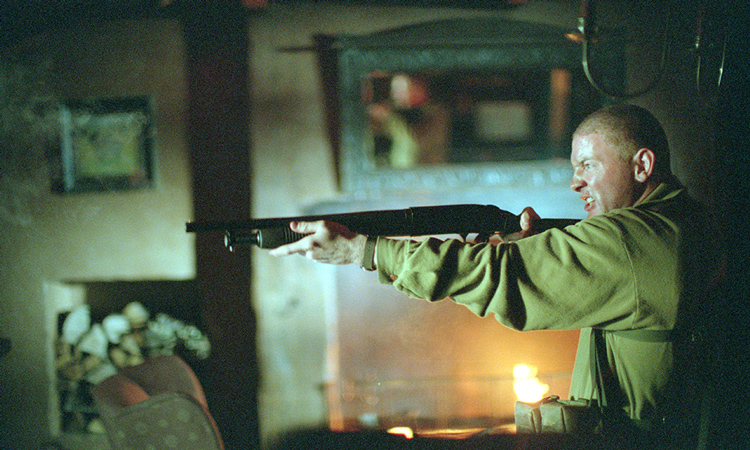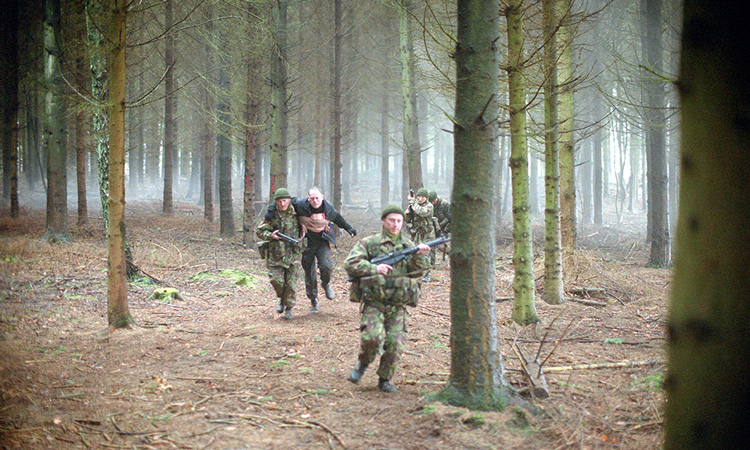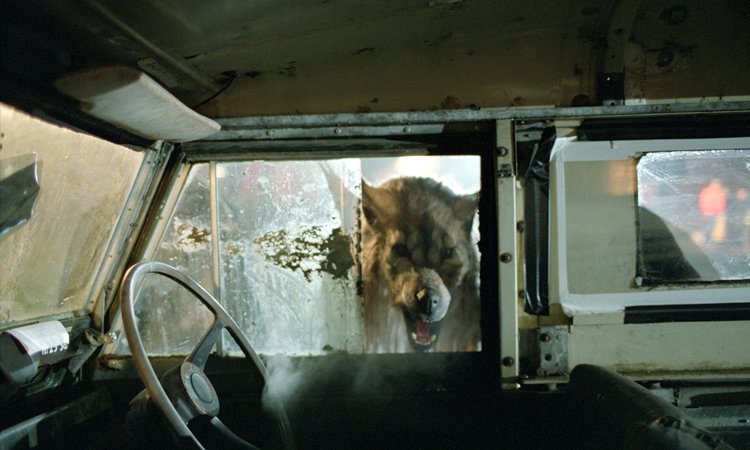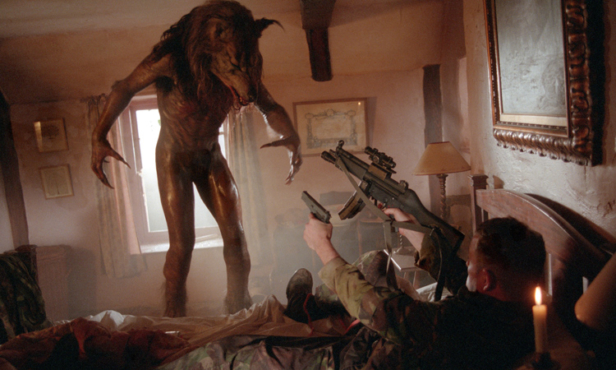Set in a remote area of Scotland, Neil Marshall’s Dog Soldiers follows a group of soldiers who find themselves facing an unusual enemy while on a training exercise. This foe is fierce, ferocious and looks like a big, feral dog. Also, if you get bit, you seem to become a lot less like yourself during a full moon…
Starring Sean Pertwee, Kevin McKidd and Emma Cleasby, Dog Soldiers captured the beginning of a horror renaissance in British film, incorporating a gritty genre feel along with excellent effects and biting (sorry) comedy. Now, 18 years later, the film is getting a whole new leash (sorry again) of life with a 4K release. We spoke to writer and director Neil Marshall about his werewolf movie, what it was like pitching a horror film in the early Noughties and his new film, The Reckoning…

What’s it like revisiting Dog Soldiers 18 years later for this 4K release?
I guess the main thing for me is the fact that people would want to revisit it 18 years later! I’m very chuffed about that for sure. People still loving it after all this time makes me feel a bit old, but it certainly makes me feel very happy. It’s got this cult following. It’s been amazing talking about it again and I’ve got a lot of memories associated with that time.
What do you think is the secret behind its endurance?
I mean you can’t set out to make a cult film, it’s the fans that make it that way. Ultimately I was setting out to make the biggest blockbuster ever [haha]. That’s the hope, that’s always the dream! But also I was making a very personal film. It’s very close to my roots having all these northern characters and making it very British and not really compromising on that at all. I didn’t want to make a mid-Atlantic film that would fall between two camps in an effort to try and make it more universal or make it appeal to the Americans or make it appeal elsewhere.
You know, [after] living [in the US] for the past eight years, I’m amazed how many Americans love it as well and get the jokes and get the humour. It didn’t get a theatrical release in the States, which was a shame, but it does have a following here. Maybe not so much as in the UK because I think people really take it to their hearts over there and I love that fact. But you know, people get the jokes, get the humour here [as well]. They don’t require subtitles, anything like that, so it’s got legs somehow, it’s found its audience through that time!
How did Dog Soldiers begin for you?
Myself and one of the producers, Keith Bell, were at film school together. After graduating, we were working in the Newcastle area trying to make a living in what was a very tiny film industry – or mainly a TV industry – at the time, doing whatever we could just to try and get a foot in the business somehow. I was editing. I edited for eight years before I ever got to direct stuff.
We both worked on this ultra low budget action thriller feature that was shot in Newcastle in 1995 called Killing Time. Everybody in the regional industry kind of teamed up and just said you know, let’s do this essentially for nothing and have a go at making a feature film! I co-wrote that and edited it and did some action coordinating and choreography and all kinds. Everybody just walked in and did about five jobs!
I think we were sitting on set one day watching the chaos ensue and me and Keith said: ‘You know, let’s do our own movie, let’s do it better than this where people get paid!’ I think at some point I pitched him: ‘What about soldiers versus werewolves?’ It was an idea that was knocking about in my head of trying to combine all my favorite movies into one. Like I wanted to do a military movie. I wanted to do a siege movie. I wanted to do a horror movie and I wanted to do a werewolf movie. It was like ‘okay, so let’s just fill all that into one idea’ and came up with this kind of siege thing, which is heavily inspired by the likes of Zulu, Assault On Precinct 13 and Rio Bravo. I spent the next six years essentially writing that script while we were trying to get it made until eventually in 2001 we got to shoot it. So it was quite a long journey.
Why have a film with werewolves and soldiers?
I have a strong connection to the military. My granddad was in the army; he fought in the Battle Of The Somme. My dad was in the army and I think if I hadn’t ended up in the film business I might have ended up in the army myself. I’ve always had a real passion for military history. So there’s that aspect of it.
There’s [also] the movie aspect of it – I was totally into horror movies. I grew up on An American Werewolf In London and The Howling. The VHS video age was my teenage years; the video nasties and things like that. So I had all that in my blood and I wanted to make a horror movie. One of my favorite directors was John Carpenter; a massive inspiration for me. So it just seemed like a natural thing.
Also horror, in many respects, just felt like a way in because it was a genre that I knew I would enjoy doing. But you can kind of do it on a lower budget. That’s always been expected of horror – that it’s a great foot in the door for making movies, but I didn’t know it was going to be so difficult to try and get a horror film made in the UK at that time! At the time nobody was making horror movies in the UK and hadn’t been doing for quite some time. It was kind of the beginning of a wave; Dog Soldiers, 28 Days Later, My Little Eye and a few others came out at a certain time that were just like riding this wave of horror that is now dominant. It has been for the past 18 years. So many horror films are getting made now, but back then, you go to any UK company, any finance company and the response we would get was “it’s not our cup of tea” or “we don’t do horror movies” – turning their nose up at you constantly. If it wasn’t that it was like “this is just way too ambitious for a first feature, you need to dial it back” and I was like “oh no, I’m not gonna dial it back. I wanna do werewolf movie!”.

Why do you think horror has become more dominant in recent years?
Nowadays there’s no excuse really. The only limitation is creativity because you can shoot a movie on your iPhone and you can edit it on your computer and you can add the music and the sound. You can pretty much do the whole thing on your computer. Obviously the difficulty is then getting it released, but there’s still a good chance you could get it released. The fact is, you can do cinema-quality movies in the comfort of your own home if you really put your mind to it. We couldn’t do that then, we had none of that ability. We had to shoot on film, we had to have a professional crew and everything else!
Werewolf movies are hard! Why do you think Dog Soldiers stands out as a werewolf movie?
Yeah certainly werewolf movies are hard, especially for low budget filmmakers! Vampires and zombies and things like that are a hell of a lot cheaper to do than werewolves – you have to create some werewolf suit or you have to do it [through] CGI. Either way, it’s expensive to do it well so I always admire anybody who has a crack at doing a werewolf movie and that’s why there are far less werewolf movies than any others I think within the classic monsters.
I think Dog Soldiers stands out because our werewolves are pretty special. I think it’s also just the nature of the film. I deliberately chose not to do that ‘curse of the werewolf story’, which pretty much every other werewolf movie is about somehow, with the possible exception of The Howling. It’s [usually] about the person who gets bitten and their story, and they’re going to turn into a werewolf blah blah blah which is fantastic but I didn’t want to do that. I just wanted to shoot the werewolves kind of like the alien in Alien or the Predator. They’re just the enemy and that’s it. They’ve got supernatural powers of sorts, you know, impervious to bullets, that kind of thing, which makes them very dangerous, but it was a war movie with werewolves and I think maybe that was different enough just to capture everybody’s imagination and make it stand out from the crowd.
How involved were you with the special effects?
A lot. I mean I could not myself, but a very good friend of mine did a rough sketch of a werewolf very early in the process. Considering the guy was a sound recordist, I wasn’t expecting him to do this amazing sketch! He did this beautiful artwork of a werewolf and from then on it was like ‘that’s our werewolf. How can we make that real?’. What made [the werewolf] different was that it was kind of elegant. It was light and elegant, very feminine looking. I just thought ‘this is so fresh and original I’ve not seen that before’ and then there was just a process of developing that.
When we came to [filiming the movie], we approached Bob Keen to make them in the UK and he did a full-size model following the original concept of these lithe, elegant, tall, thin-looking things. I actually hired dancers to be in the costumes rather than stunt guys beccause I wanted people who had real grace and elegance in their movement. So it was a process that went all the way through but bringing in amazing talents like Bob Keen and Dave Bonneywell who ultimately fine-tuned the design and created what we see on screen. I had a hand in that whole process all the way along.

You have written and directed many genre movies including The Descent and Hellboy. What is it about genre that attracts you?
I love genre filmmaking of all forms; sci-fi action, horror, fantasy, whatever. That’s the stuff that appealed to my imagination the most when I was growing up. I got very very lucky timing-wise. I was a child of the Eighties – the Eighties encompassed my teenage years and had a massive effect on me. I think the films that were coming out through that time hugely impacted my psyche and the kind of things I wanted to do. I would say that was great in terms of timing for being inspired but I also think maybe I should have been born 20 years earlier so I was making movies in the Eighties. Maybe I would have fit in better then, I don’t know. That certainly is a massive part of it, but I think it’s just worlds of limitless imagination. I love creating worlds. I like world-building within my movies for sure.
Can you tell us more about your next film The Reckoning? You have a Dog Soldiers reunion with Sean Pertwee starring in it…
Yeah, so it’s the UK premiere of The Reckoning at FrightFest [on 23 October] and it was a chance to work with Sean [Pertwee] again. I haven’t worked with him since Doomsday and it was such a pleasure to get him back on screen. It’s a very different kind of role to what we’ve done before, and he just was fantastic in it. Alarmingly it’s set during the Great Plague, which is just like… yeah… we had no idea what was going on when we were filming this last year in Hungary. [We had] no idea how the world was going to change. So it’s painfully kind of ironic, but that’s really a backdrop of the story.
The main story is about a woman falsely accused of being a witch. Having lost her husband [in the plague] she [now has a] young baby [to look after] and the local squire hits on her. Basically threatens her. He says ‘sleep with me or I’m kicking you out of your house’. She refuses, he assaults her, she fights back and he accuses her of being a witch. She gets thrown in jail and undergoes a series of horrific trials and torments. She’s persecuted not only physically, but psychologically as well but ultimately fights back…
I wanted to make something that wasn’t just a straight horror film but that has something to say about the world today. It’s about female empowerment, about persecution and bigotry. I started researching this subject and I was horrified; there were nearly half a million, mostly women, not all women, but mostly women, who were tried, tortured and executed for this crime of witchcraft – which doesn’t actually exist. It’s not a real thing, and it’s just men abusing power and religions abusing power. I just got fascinated by all that. Then [I found] other little tidbits of information that I’ve never heard of before. People were so scared that witches and the devil were causing the plague that they were rounding up and killing hundreds and thousands of cats because cats were the witches’ familiars. Or they assumed, and because they were killing all the cats it allowed the rats to spread [the plague] even further. So I just thought it was like a bizarre bit of ironic history!
Dog Soldiers is available now on 4K from Vertigo Releasing.
